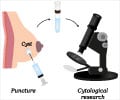A new study conducted by American researchers has found that a natural protein found in the surrounding tissue of a tumor can be used to stop triple negative breast cancer from metastasizing.

"These findings provide a new paradigm for decorin, with great implications for curbing tumor growth by inducing new tumor suppressor genes within the tumor microenvironment, and for the discovery of novel gene signatures that could eventually help clinical assessment and prognosis," said senior author Renato V. Iozzo, M.D., Professor of Pathology, Anatomy and Cell Biology, at Thomas Jefferson University.
Triple negative breast cancer is the most deadly of breast cancers, with fast-growing tumors, that disproportionately affect younger and African-American women. Today, no such marker is applied in care of triple negative breast cancer, and as a result, patients are all treated the same.
"Originally, we thought that decorin was affecting the tumor, but, surprisingly, decorin affects the so-called tumor microenvironment, where malignant cells grow and invade, igniting genes to stop such growth," said Dr. Iozzo, who is also a member of Jefferson''s Kimmel Cancer Center. "Absence of decorin in the microenvironment could explain metastasis in some patients, where higher levels of the protein may keep cancer from spreading."
In the study, 357 genes were found to be induced by the increased presence of decorin, but more interestingly, the researchers discovered that three of these genes, which were previously unlinked to triple negative breast cancer, were tumor suppressor genes affecting the tumor microenvironment, including Bmp2K, Zc3hav1, and PEG3.
Decorin is a naturally occurring substance in the connective tissue where, among other roles, it helps regulate cell growth by interacting with growth factors and collagen. A decade ago, Dr. Iozzo and his team discovered that decorin, a cell protein, and specifically, a proteoglycan, is increased in the matrix surrounding tumor cells. They also discovered that decorin causes production of a protein, p21, which also can arrest cell growth. However, decorin''s role in breast cancer and the mechanism behind its anti-tumor properties remained elusive.
Advertisement
Tumors treated with decorin were found to have a decreased volume of up to 50 percent after 23 days. Using a sophisticated microarray technique, the researchers then analyzed the mouse tumor microenvironment, finding increased expression of 357 genes, three of which are the tumor suppressor genes of interest.
Advertisement
"Here, we have a molecule that can turn a tumor microenvironment from a bad neighborhood to a clean neighborhood by inducing genes in that neighborhood to stop growth and prevent the tumor from metastasizing," said Dr. Iozzo.
##
This work was in part supported by the National Institutes of Health grants RO1CA39481, RO1CA47282 and RO1CA120975.
###
Thomas Jefferson University (TJU), the largest freestanding academic medical center in Philadelphia, is nationally renowned for medical and health sciences education and innovative research. Founded in 1824, TJU includes Jefferson Medical College (JMC), one of the largest private medical schools in the country and ranked among the nation''s best medical schools by U.S. News & World Report, and the Jefferson Schools of Nursing, Pharmacy, Health Professions, Population Health and the Graduate School of Biomedical Sciences. Jefferson University Physicians is TJU''s multi-specialty physician practice consisting of the full-time faculty of JMC. Thomas Jefferson University partners with its clinical affiliate, Thomas Jefferson University Hospitals.
Source-Newswise















